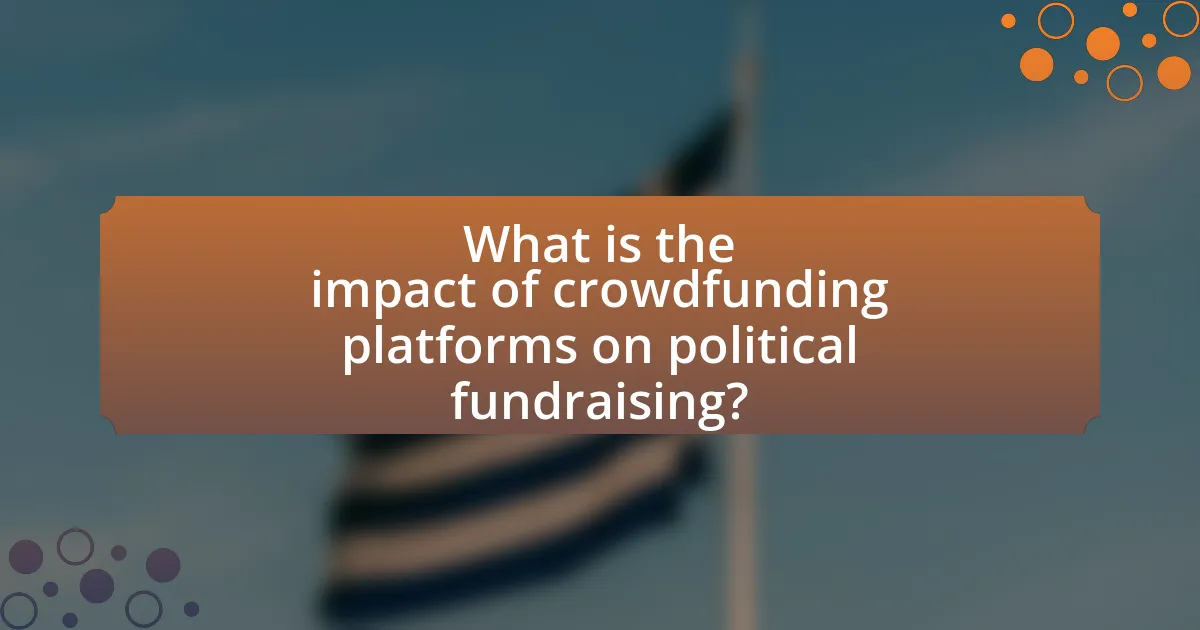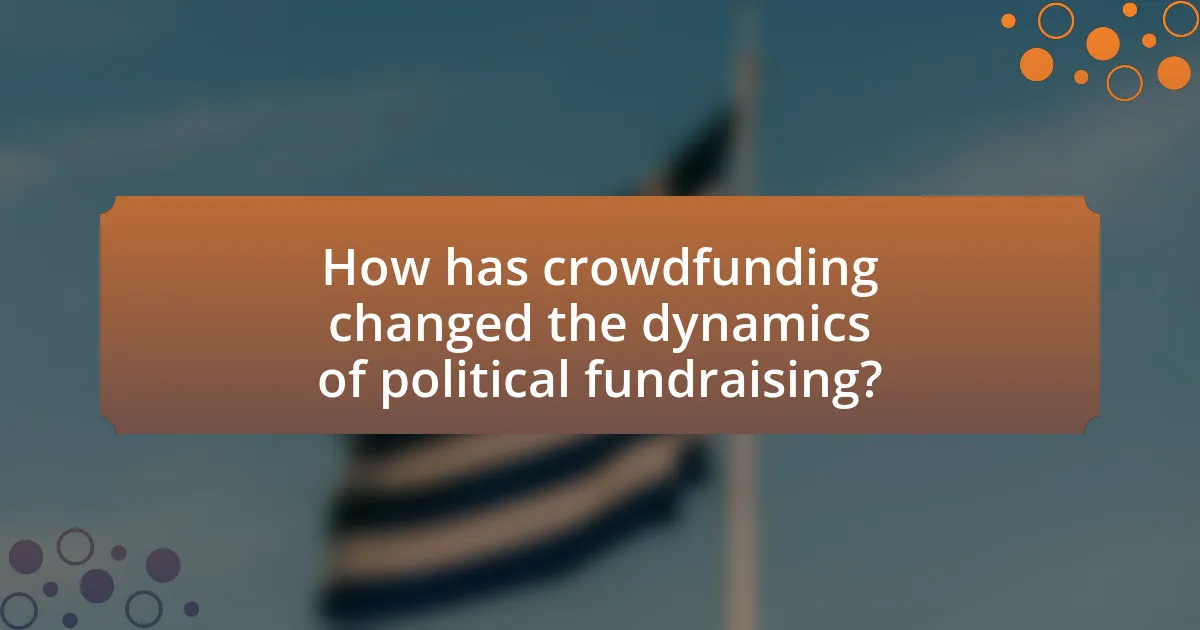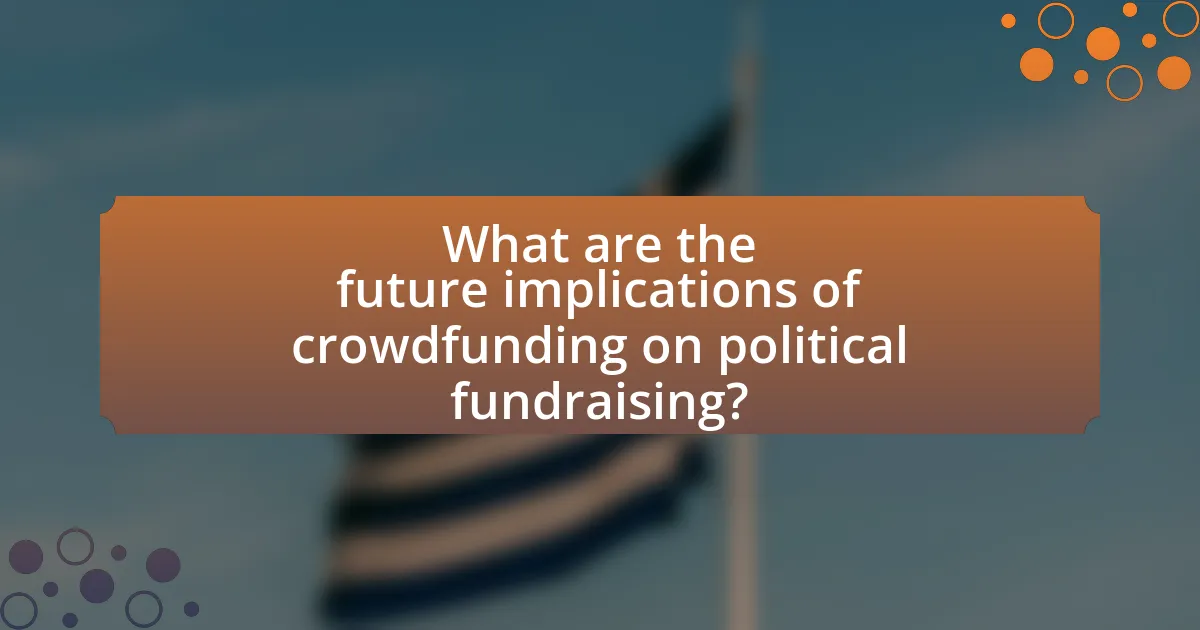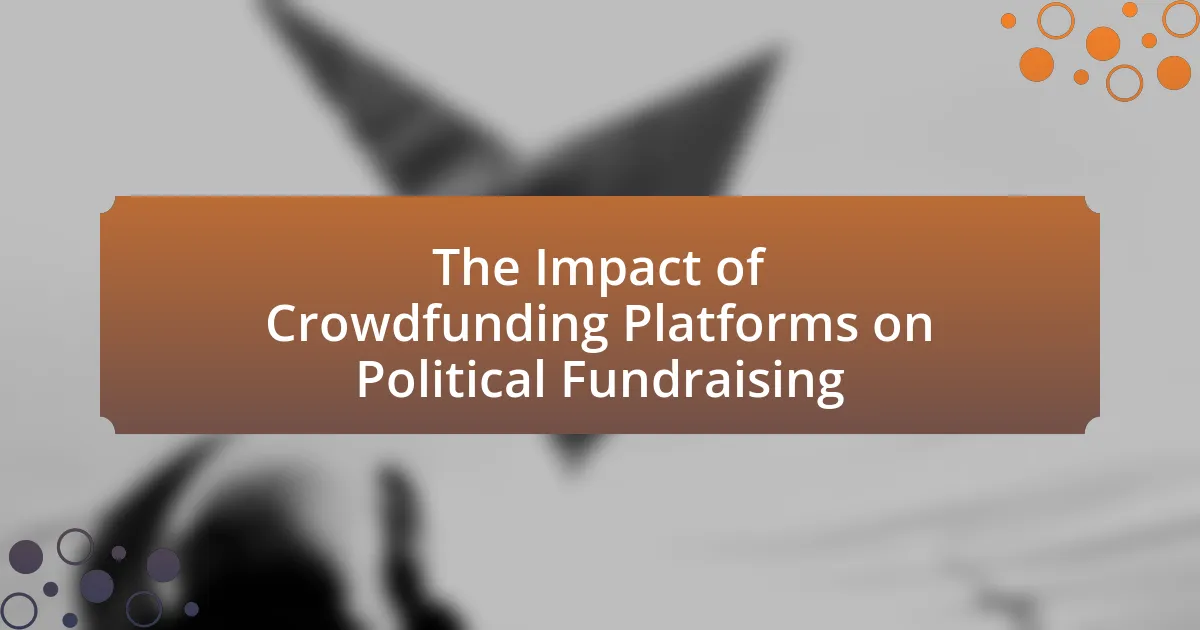Crowdfunding platforms have transformed political fundraising by democratizing access to financial support, allowing candidates to raise significant amounts from small donations. This article examines the operational dynamics of crowdfunding within the political landscape, highlighting key features that enhance fundraising efforts, such as user-friendly interfaces and social media integration. It also discusses the advantages of crowdfunding, including increased accessibility and engagement, while addressing challenges like regulatory compliance and potential risks. Furthermore, the article explores emerging trends, the evolving demographics of political donors, and the future implications of technology and legislation on crowdfunding in political campaigns.

What is the impact of crowdfunding platforms on political fundraising?
Crowdfunding platforms significantly enhance political fundraising by democratizing access to financial support for candidates and causes. These platforms allow individuals to contribute small amounts of money, which collectively can lead to substantial funding, as evidenced by the 2016 U.S. presidential election where candidates like Bernie Sanders raised over $200 million through small donations via crowdfunding. This shift enables grassroots movements to gain traction, reducing reliance on large donors and traditional fundraising methods. Furthermore, crowdfunding platforms facilitate direct engagement between candidates and supporters, fostering a sense of community and shared purpose, which can lead to increased voter mobilization and participation.
How do crowdfunding platforms operate within the political fundraising landscape?
Crowdfunding platforms operate within the political fundraising landscape by enabling candidates and political organizations to raise small amounts of money from a large number of supporters, often through online campaigns. These platforms facilitate direct engagement between candidates and their constituents, allowing for grassroots fundraising efforts that can significantly amplify traditional fundraising methods. For instance, in the 2020 U.S. elections, platforms like ActBlue and GoFundMe played crucial roles, with ActBlue alone processing over $4 billion in donations for Democratic candidates, demonstrating the effectiveness of crowdfunding in mobilizing financial support.
What are the key features of crowdfunding platforms used for political campaigns?
Crowdfunding platforms used for political campaigns typically feature user-friendly interfaces, social media integration, transparent funding processes, and compliance with legal regulations. User-friendly interfaces allow candidates to easily create and manage their campaigns, while social media integration facilitates sharing and outreach to potential donors. Transparent funding processes ensure that contributors can see how their donations are utilized, fostering trust. Compliance with legal regulations is crucial, as it ensures that campaigns adhere to campaign finance laws, which vary by jurisdiction. These features collectively enhance the effectiveness of fundraising efforts in political campaigns.
How do these features facilitate fundraising for political candidates?
Crowdfunding platforms facilitate fundraising for political candidates by providing accessible and efficient channels for small donations. These platforms enable candidates to reach a broader audience, allowing supporters to contribute easily through online transactions. For instance, in the 2020 U.S. elections, candidates like Bernie Sanders raised significant amounts through crowdfunding, demonstrating the effectiveness of these platforms in mobilizing grassroots support. Additionally, features such as social sharing tools and transparent tracking of fundraising progress encourage engagement and motivate potential donors to contribute, thereby enhancing overall fundraising efforts.
What are the advantages of using crowdfunding for political fundraising?
Crowdfunding offers several advantages for political fundraising, including increased accessibility, broader reach, and enhanced engagement with supporters. By utilizing online platforms, candidates can tap into a larger pool of potential donors, allowing individuals who may not have been able to contribute through traditional means to participate. For instance, in the 2020 U.S. elections, candidates like Bernie Sanders raised significant amounts through small donations from a vast number of supporters, demonstrating the effectiveness of crowdfunding in mobilizing grassroots support. Additionally, crowdfunding fosters a sense of community and involvement, as supporters feel directly connected to the campaign’s success, which can lead to increased loyalty and advocacy.
How does crowdfunding increase accessibility for political candidates?
Crowdfunding increases accessibility for political candidates by allowing individuals to raise funds directly from a large number of supporters, bypassing traditional financial barriers. This democratizes the fundraising process, enabling candidates with limited resources or those from underrepresented backgrounds to compete more effectively. For instance, in the 2020 U.S. elections, candidates like Andrew Yang utilized crowdfunding platforms to gather millions from small donors, illustrating how grassroots support can translate into significant financial backing. This shift not only empowers diverse candidates but also fosters greater engagement among voters, as supporters feel a direct connection to the campaign’s financial success.
What role does social media play in enhancing crowdfunding efforts?
Social media significantly enhances crowdfunding efforts by providing a platform for widespread outreach and engagement. It allows campaigners to share their projects with a large audience quickly, facilitating the rapid dissemination of information. According to a study by the University of California, Berkeley, campaigns that utilized social media saw a 30% increase in funding compared to those that did not. This increase is attributed to the ability of social media to create a sense of community and urgency, encouraging users to contribute and share campaigns within their networks. Additionally, social media platforms enable real-time interaction, allowing campaigners to respond to potential backers and build relationships, which further drives funding success.
What challenges do political candidates face when using crowdfunding platforms?
Political candidates face several challenges when using crowdfunding platforms, including regulatory compliance, donor engagement, and platform fees. Regulatory compliance is critical, as candidates must adhere to campaign finance laws that vary by jurisdiction, which can complicate fundraising efforts. Additionally, engaging potential donors can be difficult; candidates need to effectively communicate their message and build trust to encourage contributions. Furthermore, crowdfunding platforms often charge fees that can reduce the total funds raised, impacting the overall effectiveness of the campaign. These challenges can hinder a candidate’s ability to leverage crowdfunding successfully for political fundraising.
How do regulatory issues impact crowdfunding for political campaigns?
Regulatory issues significantly impact crowdfunding for political campaigns by imposing restrictions on contribution limits, disclosure requirements, and compliance obligations. These regulations can limit the amount of money that individuals can contribute to campaigns, thereby affecting the overall fundraising potential. For instance, the Federal Election Commission (FEC) enforces contribution limits that restrict how much an individual can donate to a candidate, which directly influences the amount of funds that can be raised through crowdfunding platforms. Additionally, regulations often require campaigns to disclose the identities of contributors, which can deter potential donors concerned about privacy. Compliance with these regulations can also impose administrative burdens on campaign teams, potentially diverting resources away from fundraising efforts.
What are the risks associated with relying on crowdfunding for political fundraising?
Relying on crowdfunding for political fundraising poses several risks, including regulatory compliance issues, potential for fraud, and the unpredictability of funding outcomes. Regulatory compliance is critical, as failure to adhere to campaign finance laws can result in legal penalties; for instance, the Federal Election Commission (FEC) mandates transparency in donations, and non-compliance can lead to fines. Additionally, crowdfunding platforms may expose campaigns to fraudulent activities, where individuals could misrepresent themselves or misuse funds, undermining trust. Lastly, the unpredictability of crowdfunding means that campaigns may not reach their financial goals, leading to insufficient resources for effective campaigning, as evidenced by studies showing that only a fraction of crowdfunding campaigns meet their targets.

How has crowdfunding changed the dynamics of political fundraising?
Crowdfunding has significantly transformed the dynamics of political fundraising by democratizing access to financial support for candidates. Traditional fundraising often relied on large donations from a limited number of wealthy individuals or organizations, which could create barriers for grassroots candidates. In contrast, crowdfunding allows candidates to solicit small contributions from a broad base of supporters, enabling them to raise substantial amounts of money without depending on major donors. For instance, during the 2020 U.S. presidential election, candidates like Bernie Sanders and Elizabeth Warren effectively utilized crowdfunding platforms, raising millions from numerous small donors, which highlighted the shift towards a more inclusive fundraising model. This change not only empowers candidates with diverse backgrounds but also fosters greater engagement among voters, as individuals feel more invested in campaigns they can directly support.
What trends have emerged in political fundraising due to crowdfunding?
Crowdfunding has led to several significant trends in political fundraising, including increased accessibility for candidates, diversification of donor bases, and enhanced engagement through social media. Increased accessibility allows candidates, especially those from underrepresented backgrounds, to raise funds without relying solely on traditional wealthy donors or party support. This shift has been evidenced by the rise of platforms like Kickstarter and GoFundMe, which have facilitated fundraising for numerous political campaigns.
Diversification of donor bases is another trend, as crowdfunding enables candidates to attract small donations from a larger number of individuals, reducing dependence on a few large contributors. For instance, the 2020 U.S. presidential election saw candidates like Bernie Sanders and Elizabeth Warren successfully utilize crowdfunding to amass millions from grassroots supporters, demonstrating a shift in how campaigns are financed.
Enhanced engagement through social media is also notable, as candidates leverage these platforms to promote their crowdfunding efforts, creating a sense of community and urgency among potential donors. This trend is supported by data showing that campaigns with strong social media presence often outperform those without, as they can mobilize supporters quickly and effectively.
How has the demographic of political donors shifted with the rise of crowdfunding?
The demographic of political donors has shifted towards a more diverse and younger base with the rise of crowdfunding. Traditional political donors were predominantly older, affluent individuals, but crowdfunding has enabled candidates to reach a broader audience, including younger voters and those from lower-income backgrounds. For instance, a study by the Pew Research Center in 2020 indicated that 43% of crowdfunding contributions came from individuals under 30, compared to only 15% from that age group in traditional fundraising methods. This shift reflects a democratization of political funding, allowing grassroots movements to thrive and increasing participation from previously underrepresented groups.
What impact does crowdfunding have on traditional fundraising methods?
Crowdfunding significantly disrupts traditional fundraising methods by democratizing access to capital and enabling direct engagement with supporters. Unlike traditional fundraising, which often relies on a limited pool of wealthy donors or institutional support, crowdfunding allows individuals and organizations to raise funds from a broad audience through online platforms. This shift has been evidenced by the rise of platforms like Kickstarter and GoFundMe, which collectively raised over $34 billion by 2021, showcasing the effectiveness of reaching diverse contributors. Furthermore, crowdfunding fosters transparency and accountability, as backers can see how their contributions are utilized, contrasting with the often opaque nature of traditional fundraising. This transformation has compelled traditional fundraising methods to adapt, integrating digital strategies to remain competitive in an evolving financial landscape.
How do successful political campaigns leverage crowdfunding platforms?
Successful political campaigns leverage crowdfunding platforms by utilizing them to mobilize grassroots support and raise funds directly from individual donors. These campaigns create engaging online content that resonates with potential supporters, encouraging small contributions that collectively amount to significant financial backing. For instance, the 2016 Bernie Sanders campaign raised over $200 million through small donations, demonstrating the effectiveness of crowdfunding in reaching a broad base of supporters. Additionally, successful campaigns often employ social media to amplify their crowdfunding efforts, allowing them to reach wider audiences and foster community engagement, which further enhances their fundraising capabilities.
What strategies do candidates use to maximize their crowdfunding efforts?
Candidates maximize their crowdfunding efforts by leveraging social media, engaging with their supporters, and offering incentives. Social media platforms allow candidates to reach a broader audience quickly, facilitating real-time communication and updates about their campaigns. Engaging with supporters through personalized messages and regular updates fosters a sense of community and encourages contributions. Additionally, offering incentives, such as exclusive merchandise or experiences, can motivate potential donors to contribute more significantly. These strategies have been shown to enhance fundraising outcomes, as evidenced by successful campaigns that utilized these methods to significantly increase their funding.
How do candidates engage with their supporters through crowdfunding campaigns?
Candidates engage with their supporters through crowdfunding campaigns by utilizing digital platforms to solicit small donations, thereby fostering a sense of community and shared purpose. These campaigns often include personalized messaging, updates on campaign progress, and incentives for contributions, which enhance supporter involvement. For instance, candidates may use social media to promote their crowdfunding efforts, allowing them to reach a broader audience and create a more interactive experience. Research indicates that campaigns leveraging crowdfunding can significantly increase donor participation, with a study by the Pew Research Center showing that 28% of Americans have contributed to a political campaign online. This engagement strategy not only raises funds but also builds a loyal supporter base, as contributors feel directly connected to the campaign’s goals and progress.

What are the future implications of crowdfunding on political fundraising?
Crowdfunding will significantly transform political fundraising by democratizing access to campaign financing and enabling candidates to engage directly with their supporters. This shift allows individuals, regardless of wealth, to contribute to political campaigns, thereby increasing the diversity of voices in the political arena. For instance, the 2020 U.S. presidential election saw candidates like Bernie Sanders and Elizabeth Warren successfully utilize crowdfunding platforms to raise millions from small donors, demonstrating the effectiveness of grassroots fundraising. As a result, future political campaigns are likely to rely more on small contributions from a larger base of supporters rather than traditional large donations from a few wealthy individuals or organizations, which could lead to a more equitable political landscape.
How might technology evolve to further influence crowdfunding in politics?
Technology will likely evolve to enhance crowdfunding in politics through advancements in data analytics, blockchain, and artificial intelligence. Data analytics can provide political campaigns with deeper insights into donor behavior, enabling targeted outreach and personalized engagement strategies. Blockchain technology can ensure transparency and security in transactions, fostering trust among contributors by allowing them to track how their funds are utilized. Additionally, artificial intelligence can optimize fundraising strategies by predicting donor preferences and automating communication, thus increasing efficiency. These technological advancements are supported by the growing trend of digital fundraising, which has seen a significant increase in online donations, with platforms like ActBlue reporting over $6 billion raised for Democratic candidates in the 2020 election cycle.
What potential innovations could enhance the effectiveness of crowdfunding platforms?
Potential innovations that could enhance the effectiveness of crowdfunding platforms include the integration of artificial intelligence for personalized campaign recommendations and the use of blockchain technology for transparent transactions. Artificial intelligence can analyze user behavior and preferences, allowing platforms to suggest campaigns that align with individual interests, thereby increasing engagement and funding success rates. Blockchain technology can ensure secure and transparent financial transactions, which builds trust among backers and reduces the risk of fraud. According to a report by Deloitte, the use of blockchain in crowdfunding can enhance accountability and traceability, which are critical for attracting more investors.
How could changes in legislation affect the future of crowdfunding in political fundraising?
Changes in legislation could significantly reshape the future of crowdfunding in political fundraising by altering the regulatory framework governing campaign finance. For instance, stricter regulations on contribution limits or transparency requirements could limit the amount of money candidates can raise through crowdfunding platforms. Conversely, more permissive laws could encourage greater participation by allowing larger contributions or reducing compliance burdens for campaigners. Historical examples, such as the Bipartisan Campaign Reform Act of 2002, demonstrate how legislative changes can directly impact fundraising strategies and the viability of different funding sources in political campaigns.
What best practices should political candidates follow when using crowdfunding platforms?
Political candidates should prioritize transparency, engagement, and compliance when using crowdfunding platforms. Transparency involves clearly communicating campaign goals, funding needs, and how contributions will be utilized, which builds trust with potential donors. Engagement includes actively interacting with supporters through updates and responding to inquiries, fostering a sense of community and encouraging further contributions. Compliance with legal regulations, such as contribution limits and reporting requirements, is essential to avoid legal issues and maintain credibility. According to the Federal Election Commission, adherence to these regulations is crucial for maintaining the integrity of the fundraising process.
How can candidates effectively communicate their campaign message through crowdfunding?
Candidates can effectively communicate their campaign message through crowdfunding by leveraging storytelling, engaging visuals, and clear calls to action. Storytelling allows candidates to connect emotionally with potential donors, making their message relatable and memorable. Engaging visuals, such as videos and infographics, can enhance the appeal of the campaign message, capturing attention and conveying information quickly. Clear calls to action guide supporters on how to contribute, ensuring that the campaign message translates into financial support. Research indicates that campaigns utilizing these strategies see higher engagement rates, with a study by the Pew Research Center showing that 60% of successful crowdfunding campaigns effectively use storytelling to resonate with their audience.
What are the key elements of a successful crowdfunding campaign for political fundraising?
The key elements of a successful crowdfunding campaign for political fundraising include a clear and compelling message, a targeted audience, effective use of social media, and transparent financial goals. A clear message articulates the campaign’s purpose and resonates with potential donors, while targeting the right audience ensures that outreach efforts reach individuals likely to contribute. Effective use of social media amplifies the campaign’s reach and engages supporters, as evidenced by the 2016 U.S. presidential campaigns that utilized platforms like Facebook and Twitter to mobilize grassroots support. Transparent financial goals build trust and encourage contributions, as campaigns that openly share their funding needs often see higher engagement and support.
